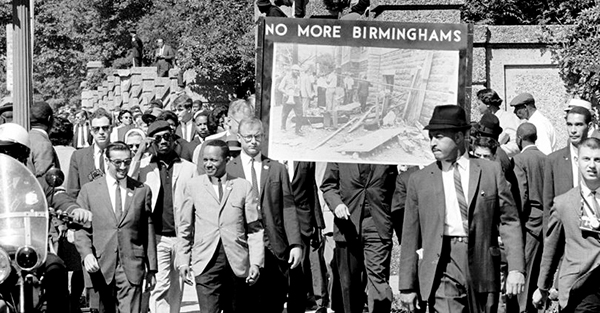Black History
60th Anniversary of Birmingham Church Bombing Unites Two Women From Opposite Backgrounds
Two women, Lisa McNair and Tammie Fields, unite against hate on the 60th anniversary of the Birmingham Church bombing, emphasizing the need for reconciliation and progress.

By Stacy M. Brown
Senior National Correspondent
@StacyBrownMedia
NNPA NEWSWIRE
Four innocent young girls getting ready for Sunday services died when the Ku Klux Klan detonated a devastating bomb inside Birmingham’s 16th Street Baptist Church 60 years ago. Today, as the nation commemorates the somber 60th anniversary of that fateful September 15, 1963, day, two remarkable women, Lisa McNair, and Tammie Fields, stand united not only by their shared tragedy but also by their unwavering message to combat hate.
McNair’s sister, Denise, was one of the four girls who tragically died in the bombing. In contrast, Fields’ father, Charles Cagle, was initially questioned as a potential suspect in the horrific church bombing but was never charged. Decades after this devastating event, the two women crossed paths at a Black History Month event, forging a seemingly improbable connection and an enduring friendship.
Despite being born on opposite sides of one of the most heinous events of the civil rights movement, McNair and Fields shared a common goal: to speak out against hate. As the nation reflects on the 60th anniversary of this tragic event, McNair implored people to remember what transpired and contemplate how to prevent such hatred from rearing its head again.
“People killed my sister just because of the color of her skin,” McNair passionately declared in an interview with the Associated Press. “Don’t look at this anniversary as just another day. Instead, consider what each of us can do individually to ensure that this doesn’t happen again.”
The explosion occurred when dynamite, surreptitiously placed outside the 16th Street Baptist Church underneath a set of stairs, exploded. The four girls, aged 11 to 14, were assembled in a downstairs washroom before Sunday services when the devastating blast occurred.
Tragically, 11-year-old Denise McNair and her friends, 14-year-olds Cynthia Wesley, Carole Robertson, and Addie Mae Collins, all perished in the explosion. A fifth girl, Sarah Collins Rudolph, Addie Mae’s sister, was also in the room and sustained severe injuries, including losing an eye.
The vile act of violence took place during the zenith of the civil rights movement, just eight months after then-Gov. George Wallace defiantly proclaimed, “segregation forever.” It occurred a mere two weeks following Dr. Martin Luther King Jr.’s iconic “I Have a Dream” speech in Washington, D.C. Three Ku Klux Klansmen were convicted in connection with the bombing: Robert Chambliss in 1977, Thomas Blanton in 2001, and Bobby Frank Cherry in 2002.
Tammie Fields, now 64, was a toddler during the bombing. She vividly remembers her father, who died several years ago, harboring deep-seated hatred and bitterness toward Black individuals. Racial slurs were commonplace, and she was encouraged to despise her Black classmates. Fields credited her preacher grandfather with showing her a different path in life. “The most important thing to me is that my children will never know the hate that I’ve known,” Fields shared.
Lisa McNair, 58, was born a year after her sister’s tragic death, and she grew up witnessing the profound sorrow that haunted her parents. Her mother often took her and her siblings to the cemetery, where she would grieve or sit solemnly.
In her book, “Dear Denise: Letters to the Sister I Never Knew,” McNair candidly wrote about her life in the aftermath of the bombing. When she first heard of Tammie Fields and learned that both were scheduled to attend the same church program, she admitted to being hesitant.
“Originally, I didn’t really want to meet her,” McNair confided to AP. “I was kind of nervous about it, even though she didn’t do it. It was almost like meeting the person who killed your sister, in a way. You’re trying to figure out how I should feel about this?”
Despite her reservations, the two women eventually met at another church where Fields was speaking. McNair listened from a pew, and when the event concluded, the two women shared a heartfelt embrace, tears streaming down their faces. “I was extremely, extremely nervous. She had every right not to accept me, but she did,” Fields remembered in a discussion with the AP.
McNair recognized the authenticity of Fields’ desire for reconciliation. Fields, now a grandmother with Black children and mixed-race grandchildren, refrained from discussing the bombing for an extended period. However, she now firmly believes that open dialogue is essential for progress. “How is it ever going to change in the world if we’re not honest?” she pondered.
Lisa McNair also expressed concern about the current political climate, where some politicians appear to be deliberately stoking divisive rhetoric. She sees valuable lessons in the events of 60 years ago for today’s society. “So much hate, so much racism is coming back up. That’s the thing that upsets me and saddens me; we should have made more progress. I think we’re going backward instead of forward,” McNair lamented.
During a recent speech in Montgomery, Alabama, McNair unveiled a small box that the funeral home had given to her family and contained items found with Denise, including patent leather shoes, a pocketbook, and a delicate handkerchief. Among these items was a chunk of concrete, about the size of a rock, embedded in Denise’s head, ultimately causing her death.
“It shows that racism can kill. Hateful words can kill. And this is a tangible piece of that,” McNair declared solemnly.














